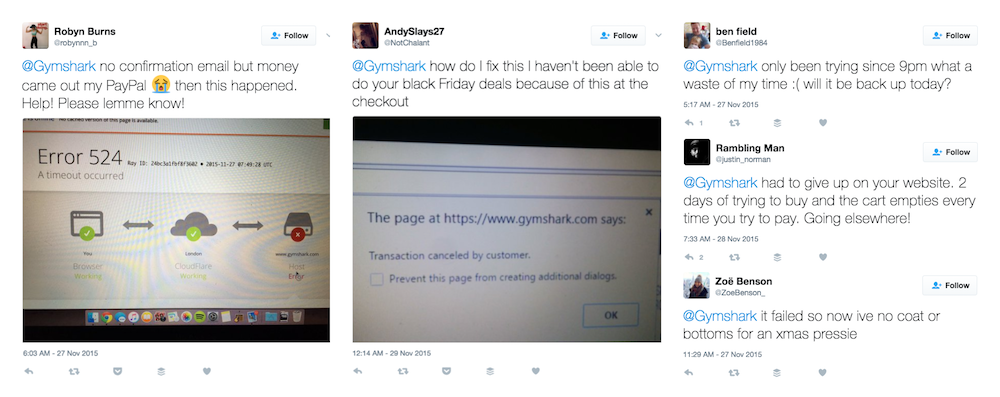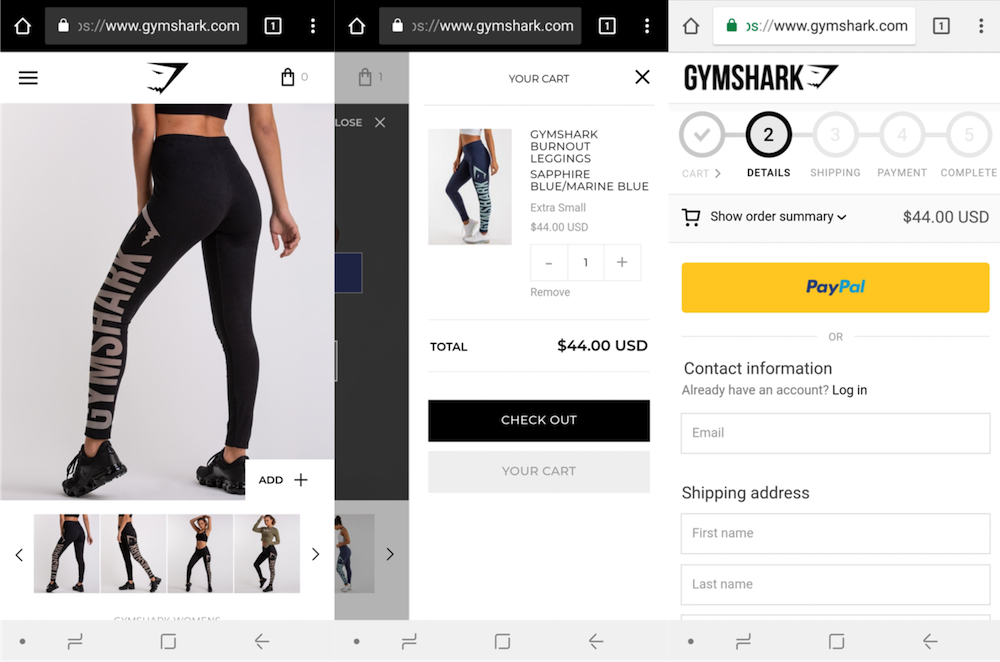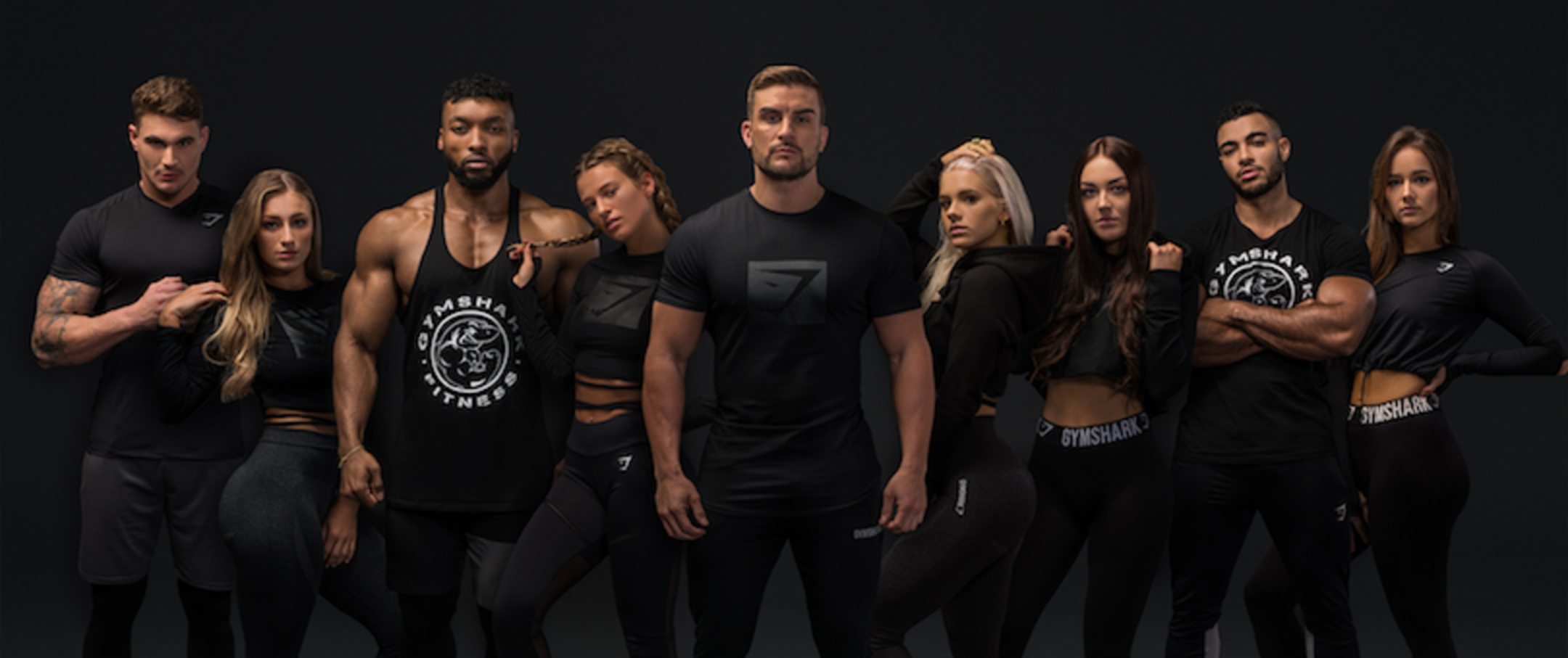Following a Black Friday crash that knocked it offline for eight hours, Gymshark — one of the fastest growing global fitness and apparel brands in the world — migrated to Shopify Plus to execute a multi-channel, global growth strategy that earned them:
- 9.3X ROI on a Black Friday social media campaign
- 197% overall increase in holiday revenue
- $128 million in FY 2018 revenue
“The great thing about Shopify Plus is the fact we fundamentally trust the platform and can do what we want almost immediately and be confident it’s going to work.
Long before Facebook’s Sheryl Sandberg was caught unabashedly flirting with the company. Prior to saving Mark Zuckerberg from the wolves of Wall Street.
Even before millions of fanatical customers scattered across 131 countries made it one of the fastest growing global fitness brands in the world …
Gymshark found itself in Black Friday hell.

“That was supposed to be a huge day for us but we let our customers down,” says Ben Francis, Gymshark’s founder. “It didn’t matter that it was Magento’s fault, it’s our brand and customers blamed us which really hurt.”
How does a 19-year-old not only build a brand generating $128 million in annual sales, but do so …
From a Garage through an ‘Absolute Nightmare’?
His car reeked of greasy pepperoni pizza.
The irony was that delivering pizza night after night is what Ben Francis knew he had to do if he wanted to succeed in the already saturated fitness industry.
Fortunately, Ben Francis, who was 19 when he founded Gymshark, has an extremely understanding mother. In fact, she gladly allowed her son to launch his fitness brand from her U.K. garage in 2012. Francis worked odd jobs and poured all of the cash he had into the fledgling business.
“This wasn’t the big baggy type of clothing bodybuilders wear,” Francis says. “I wanted to make handmade, fitted clothing that younger people wanted to wear to the gym. I wanted to create a line of fitness apparel I wanted to wear to the gym.”

Gymsharks’s current site perfectly reflects their brand ethos
Initially, Francis was generating approximately $400 a day in online apparel sales. But demand spiked when he introduced his company at a popular trade show and was inundated with orders: roughly $42,000 in a single day.
“That was the first time,” Francis recalls, “we realized we were onto something.”
Gymshark was born on Shopify, but when the first big waves of growth hit, they quickly realized they needed a new solution. That was 2013 — prior to the advent of Shopify Plus — so Francis and the Gymshark team began looking at competing platforms that could handle the company’s accelerating growth. They settled on Magento.
“It took six to eight months just to build the site,” Francis recalls. “By the time the site was finished, we had doubled in size and had already outgrown the site.”
In addition to its lengthy launch process, the site cost hundreds of thousands of dollars to build and maintain. But finally, there it was. Just in time for the granddaddy of all shopping days: Black Friday.
The failure cost Gymshark an estimated $143,000 in lost sales. Worse, it also cost the company the trust it had spent years earning from customers expecting a great experience.
The culprit, according to Gymshark’s Chief Technology Officer Seb Mills, was an application not even being used in conjunction with Gymshark’s Black Friday campaign.
It was an absolute nightmare,” Mills says. “One bug in one app we weren’t even using crashed the entire site. It was the lowest of lows.
Afterward, the Gymshark team did the only two things it could:
One, apologize. Francis penned more than 2,500 handwritten apologies that included discounts to those who were affected by the Black Friday crash.
“We have the same morals and values as we did when we were a small company,” Francis says. “Each of these customers is a human being and deserves to be treated the way I’d wanted to be treated if a brand let me down.”
Two, replatform …
Reliability Meets Customization: ‘We fundamentally trust the platform’
Ten months after entering into a relationship with Magento, Gymshark returned home to Shopify, sort of. This time, it was able to replatformed onto Shopify Plus, an enterprise-level offering that scales on demand alongside dynamic brands like Gymshark.
Not only did Francis and his team need a reliable platform, but also one that can be customized to offer personalized customer experiences across the globe.
For example, Gymshark uses Shopify Scripts, which offers merchants the ability to customize the checkout and surprise customers with freebies that earn loyalty. Specifically, Gymshark has used Scripts to:
- Run site-wide promotions for major events
- Reward specific purchases with complimentary gifts
- Auto-hide certain shipping options based on customer location
Similarly, Gymshark’s checkout process itself — from product pages to payment — is customized for a mobile-first ecommerce experience:

“It’s something that would’ve taken a lot of money and weeks to accomplish on Magento,” Francis says. “The great thing about Shopify Plus is the fact we fundamentally trust the platform. We can go into Black Friday and don’t need to worry about the website crashing, whether we can or can’t handle it.”
With a platform on which he could rely, Francis positioned Gymshark to continue scaling a …
Global Ecommerce Strategy Rooted in Local Experiences
Born in the age of social media, Gymshark is a brand built in large part on creating meaningful connections that endure. One way the company does this is with its brand ambassadors; fitness icons with millions of raving social media followers.
In what can only be likened to an all-star collection of rock and roll stars going on tour together and offering free admission to concerts, Gymshark organizes and executes its own world tours; massive undertakings in which it flies its iconic fitness ambassadors all around the world so fans and followers can meet their idols in person and without charge.
“We get goosebumps,” says Francis, “watching Gymshark customers who have driven hundreds of miles to meet their fitness idols face to face. People are fascinated with athletes and these meetups and pop-up stores remove the layer between fans and their heroes and create emotional experiences that are truly moving.”
Gymshark powers its immersive online-offline customer experiences with Shopify’s POS system to help organize world tours where Gymshark customers can meet their fitness idols and make purchases in person at expos and special events.
Not only does the Shopify Plus POS system allow merchants to sell anywhere, but the centralized reporting also positions businesses to see both physical and digital sales in real-time.
“It’s a customer experience second to none,” says Daniel Knight, Gymshark’s website manager. “It bridges the gap between the digital and physical worlds and creates emotional customer experiences that can’t be had online alone.”
Learn more: Omnichannel vs. multichannel
Multi-Channel Campaigns to 3X Holiday Revenue
It was asymmetric marketing at its finest …
The images and content Gymshark scatters across its digital properties are famously bright and almost over-exposed in some cases.

Sampling of Gymshark’s recent Instagram posts
However, once a year around Black Friday the company runs a “Blackout” campaign in which it reverses normal course and offers prospects and customers imagery they can’t help but notice.
“Everything turns dark and black, says Noel Mack, Gymshark’s Brand Director. “Models wear black on black clothing and we’ll even post completely blank black images on Instagram with no caption to intrigue our consumer. It’s a real departure from our usual content.”
Instead of first creating a “hero” piece of content and then trying to stretch and squeeze it to fit the various social media formats, Gymshark took the opposite approach.
The “Blackout” team first decided which platforms and formats would best tell the story it desired to tell. Only then did it engineer content specifically designed to fit the selected sizes, formats, and aspect ratios.
“We consider ourselves a real forward-thinking brand and want to continually push the boundaries of what’s possible,” Mack says. “We often toss out the rulebook with stuff like this and it can really pay off.”
Pay off it did …
Facebook took notice of Gymshark’s campaign and was so impressed, COO Sheryl Sandberg highlighted Gymshark’s success when pressed on a quarterly earnings call by a Wall Street analyst for an example of a European brand using Facebook not only to generate demand but lift sales.
Sandberg said this on the call:
“Gymshark is a fitness clothing brand based in the U.K. They ran Facebook video ads and Instagram Story ads for their Black Friday campaigns.
“They target with lookalikes [audiences] people who had previously purchased and custom audiences of people who had started but didn’t complete the purchase [process] and they saw a 9.3 times return on investment for the two week holiday period.”
That campaign helped Gymshark grow its year-over-year holiday revenue 197% … breaking their previous sales record by roughly 3X.
Importantly, Gymshark cites Facebook’s targeting tools as a big factor driving its growth on Facebook and Instagram.
The ability to target custom and lookalike audiences combined with rigorous A/B testing has positioned Gymshark to identify and target only the best-performing groups. Even better, the advanced targeting capabilities have not only allowed Gymshark to generate leads but also convert prospects already in the funnel.
Here’s Sandberg again:
“What happens on our platform is people start out doing demand generation and then use the repeat opportunity to show people ads moving [them] down the funnel to demand fulfillment.
“If you use our targeting tools well, you can actually start out with demand fulfillment. So some of the examples I’ve shown on this call from Holiday Inn to Gymshark are about people using the targeting tools to find the people who are interested in the products and then you can get [them] closer and down the funnel to demand fulfillment.”
But, is it really possible that you too could get Sheryl Sandberg or Mark Zuckerberg to mention your brand to the world?
In Gymshark’s case, the team had an inkling but was still on the edge of its seat during the call.
“We have some great associates at Facebook who were really rooting for us to make the earnings call so we had a good idea we would be mentioned.
“However, sitting in on that call and hearing our business which grew from extremely humble beginnings mentioned by the likes of Mark and Sheryl was a surreal moment for us for sure.
I don’t think we will ever get used to the recognition from some of the most revered and respected people of our generation.” - Noel Mack, Gymshark
Beyond Black Friday, Beyond $100 Million
Fast growing brands executing a global multi-channel strategy know intuitively that what made them their first $50 million in sales isn’t likely enough to generate their next $50 million. Nor will their approach to hitting $100 million propel them to $500 million.
The most successful global brands routinely experiment with and develop new sales channels, O2O commerce, and ultra-custom storefronts to accelerate growth.
It’s a concept Francis is well familiar with as he considers new ways Gymshark might enhance the customer experience or sales channels through which the company might engage its 5.1 million social media followers.
“We’re looking at doing some big things and really stepping it up,” he says.
Whether that includes integrating the latest moisture-wicking technology into its products or introducing next-generation wearables that can prevent athletes from pulling muscles or injuring themselves, Francis has positioned Gymshark to sell anywhere its customers want to buy.
“It’s a good thing we went onto Magento because otherwise we’d probably take a lot of what Shopify Plus does for granted,” Francis says. “Now we have set the standard, all our forthcoming campaigns need to continue to improve as we continue on our journey towards being the greatest fitness brand in the world.”
Read More
- How a Stagnant Customer Base Prompted a Coffee Company to Launch a New Brand in Two Weeks & Score with Millennials
- rockflowerpaper Saved $200K Per Year Switching from Symphony Commerce
- What Selling Bongs & Being Stubborn Can Teach You About Page Speed & Average Order Value
- Why Marshawn Lynch Chose Shopify Plus to Power His Flagship Store Two Days Before Retiring from the NFL
- How Whimsy Rose Uses the Shopify Plus API to Co-Create Personalized Fashion With Customers On Demand
- Dissecting Nike's Omni-Channel Experience
- How Death Wish Coffee Made $2,083 a Minute by Winning the Super Bowl
- How Nestlé Is Using Shopify Plus to Target Millennials by Making Adulthood Suck Less
- How Big Brands Rock Offline Marketing Strategies to Get Real with Customers
- How an Indian Retail Conglomerate Sells Across Global Online Marketplaces






